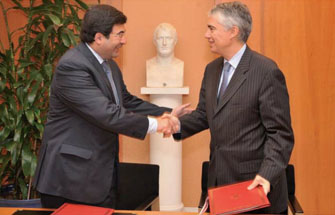
Today the Principality of Monaco can claim to have implemented a foreign policy that is in line with the requirements and constraints of international standards relating to fiscal transparency. The direct result of this active policy is that since September 2009 the name of the Principality of Monaco has featured on the OECD’s White List, meaning that the country’s desire to cooperate in tax matters has been acknowledged, while it remains internationally competitive.
The negotiations concerned agreements of two sorts: one allows information to be exchanged between tax authorities on request; the other, more complex, leads to an Agreement to avoid double taxation.
So far the Principality has signed 15 tax cooperation agreements in addition to the Franco-Monegasque fiscal convention of 1963.
The countries with which agreements for the exchange of tax information have been signed are: the Principality of Andorra, the Argentine Republic, the Republic of Austria, the Commonwealth of the Bahamas, the Kingdom of Belgium, the United States of America, the Principality of Liechtenstein, the Republic of San-Marino, Samoa, the Kingdom of the Netherlands and Australia.
Double taxation agreements concern, for the moment, the Grand Duchy of Luxembourg, the State of Qatar, Saint Kitts and Nevis, and the Republic of Seychelles.
On-going negotiations for other agreements
Negotiations are under way with seven Scandinavian countries, both members and non-members of the EU. An agreement with Germany was recently initialled and should be signed in the next few weeks.
It should be remembered that the OECD will evaluate states newly registered on the White List to ensure that their agreements, and the modes of application of these agreements, comply with OECD standards.
The evaluation of the Principality is under way, and the report should be available before the summer.
Advantages for Monaco
Over and beyond its acknowledged attractions – political stability, quality of life, maintenance of a high level of security – the Principality is endeavouring to encourage foreign residents to stay here and to explore new ways of attracting other new residents or even families who would settle here with, if possible, some of their centres of interest and economic activities. These endeavours, generally referred to as “on-shore” development, are now possible since the Principality of Monaco is no longer considered as a tax haven with policies that are disloyal with respect to third-party states.
Improving the image of the Principality
In this respect, the foreign policy adopted at the instigation of H.S.H. the Sovereign Prince has enabled the Principality to improve its international image in economic terms so as to concentrate solely on its true expertise and specificity in the face of economic globalization and the resulting constraints. Through these cooperative acts and their practical manifestation, the agreements, the Principality has demonstrated its ability to comply with international standards, its reactivity, reflected in the number of agreements finalized in just a few months since the last G20, and the seriousness with which it faces up to its commitments.
Changes for Monaco’s financial markets
Monaco’s financial market, internationally renowned for its professionalism, is evolving rapidly so as to respond still better to the needs of a demanding but high quality clientele, seeking to offer local services so as to remain competitive in the face of the issues raised by globalization. Today it represents €75 billion under management, almost 20% of the Principality’s economic activity, and 2,500 jobs.
While private banking remains the main activity of the financial market, other financial products with considerable potential for development are beginning to emerge, such as wealth management, hedge funds, funds of funds, capital investment, and environmental and socially responsible investment.
To allow the market to adapt and become a genuine alternative to other European financial markets, Monegasque legislation has been substantially reviewed; these changes will continue, but have already made it possible to attract new fund managers.
This modernization of the financial market has been accompanied by the installation of systems of financial control to ensure that rules of ethics and transparency are observed.





